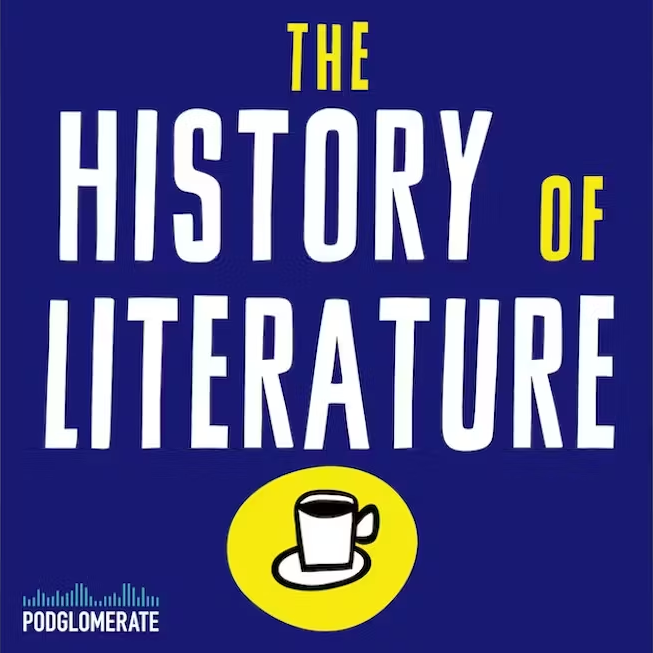History
-
The History of Literature #524 — Growing Old with The Graduate – Mike Nichols, Roger Ebert, Charles Webb, and Me
The Graduate, a 1967 film directed by Mike Nichols and based on a novel by Charles Webb, introduced the world to actor Dustin Hoffman and became one of the most beloved Hollywood comedies ever made. Telling the story of a disaffected college graduate who has an affair with an older woman and then falls in… Continue reading
-
The History of Literature #523 — Geoffrey Chaucer (with Marion Turner) | A New Podcast About the 1968 Memphis Sanitation Strike (with AFSCME President Lee Saunders)
Thanks mostly to the achievement and success of his Canterbury Tales, poet Geoffrey Chaucer (c. 1340s-1400) has been called “the Father of English literature” for more than 500 years. In this episode, Jacke talks to University of Oxford Professor Marion Turner (Chaucer: A European Life; The Wife of Bath: A Biography) about what made Chaucer so special… Continue reading
-
The History of Literature #522 — Class, Whiteness, and Southern Literature (with Jolene Hubbs) | My Last Book with Mark Cirino
In the late nineteenth century, a popular magazine ran a cartoon with what it called “a race problem.” Tensions between black and white Americans in the postwar era? Nope. It was referring to a poor white southerner – shabby, slouching, lazy, and dumb – the kind of good-for-nothing layabout who would bring down the striving… Continue reading
-
The History of Literature #521 — The Empress Messalina (with Honor Cargill-Martin) | My Last Book with Robert Chandler
The empress Messalina, third wife of the Roman emperor Claudius, was a ruthless, sexually insatiable schemer – or was she? But while the stories about her are wild (nightly visits to a brothel, a 24-hour sex competition), the real story is much more complex. In this episode, Jacke talks to historian Honor Cargill-Martin about her… Continue reading
-
The History of Literature #518 — The Curse of the Marquis de Sade – A Notorious Scoundrel, a Mythical Manuscript, and the Biggest Scandal in Literary History (with Joel Warner) | My Last Book with Diane Rayor
Not even imprisonment could stop the Marquis de Sade from writing his insanely intense, unrelenting erotica – and not even Sade’s eventual death could stop his secret manuscript, temporarily hidden in a Bastille wall to protect it from looters and revolutionaries, from haunting its owners as though possessed by a demonic force. Now one of… Continue reading
-
The History of Literature #517 — The Marquis de Sade
The Marquis de Sade (1740-1814) was more than just a rake or a cad – based on his egregious conduct, he clearly belonged in prison, and one sympathizes with the father who aimed a pistol at Sade’s chest and pulled the trigger, hoping to end the demon’s life. (The gun misfired.) But what about Sade’s… Continue reading
-
The History of Literature #515 — The Plague by Albert Camus (with Alice Kaplan and Laura Marris) | My Last Book with Alison Strayer
What were you doing when the pandemic arose? And did you turn to The Plague by Albert Camus to help you make sense of it all? For two Camus scholars, the pandemic resonated in unexpected ways – and shed new light on a work they’d been studying for years. In this episode, Jacke talks to authors Alice… Continue reading
-
The History of Literature #513 — The Writers of Northern Ireland (with Alexander Poots) | My Last Book with Laura Lee
The literary world has long celebrated the incredible contributions of Ireland and its writers, with a special focus on Dublin-centric writers like James Joyce and W.B. Yeats. Meanwhile, Northern Ireland has been quietly turning out some excellent work as well, thanks to figures like C.S. Lewis and Seamus Heaney, among many others. Are there common… Continue reading
-
The History of Literature #512 — Hannah Arendt (with Samantha Rose Hill) | My Last Book with Scott Carter
Born to a German-Jewish family in 1906, Hannah Arendt became one of the most renowned political thinkers of the twentieth century. Her works, including The Origins of Totalitarianism, The Human Condition, and Eichmann in Jerusalem, have never been more relevant than they are today. In this episode, Jacke talks to author Samantha Rose Hill about her biography Hannah… Continue reading
-
The History of Literature #508 — Lord Byron (with David Ellis) | My Last Book with Ariel Lawhon, Susan Meissner, and Kristina McMorris)
The poet Lord Byron is well known as a passionate revolutionary and a brooding hero who harbors dark secrets. But what about his playful sense of humor? In this episode, Jacke talks to Byron biographer David Ellis (Byron) about the Romantic poet’s flamboyant life and work. PLUS Ariel Lawhon, Susan Meissner, and Kristina McMorris, the… Continue reading
